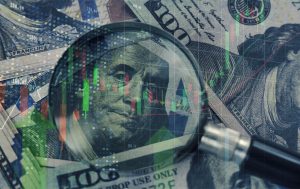The U.S. dollar was buoyed by rising U.S. Treasury yields on Tuesday, placing significant pressure on low-yielding currencies such as the Chinese yuan and the Japanese yen, with the latter reaching its lowest level since 1986. Benchmark 10-year Treasury yields rose nearly 14 basis points to 4.479% overnight, driven by expectations of a potential Donald Trump presidency, which could lead to higher tariffs and increased government borrowing.
On Tuesday, the yield on the 10-year note slightly decreased by 2 basis points, standing at 4.4554%, near its highest level since the start of the month. As the dollar strengthened, the euro gave back some of its recent gains, dropping 0.2% to $1.07188 after the first round of France’s election results aligned closely with polling expectations.
Analysts noted that Trump’s stronger debate performance against President Joe Biden heightened expectations of rising inflation, steeper yield curves, and a continued premium on the dollar. The yen fell to 161.745 per dollar, its weakest point in nearly 38 years, due to a significant interest rate differential between the U.S. and Japan. Despite Japan’s finance minister’s vigilance towards sharp currency market movements, there was no clear indication of an intervention.
The yen’s weakness extended across other currency pairs. It reached a lifetime low of 173.67 against the euro on Monday and remained near that level on Tuesday. Against the Australian dollar, the yen approached its lowest level in 33 years as carry trades remained attractive.
The dollar index (DXY), which measures the U.S. currency against six others, rose 0.1% to 105.94, with market attention focused on upcoming jobs data and Federal Reserve Chair Jerome Powell’s comments at the ECB forum in Portugal.
Sterling also weakened, down 0.15% at $1.2632, near its lowest level since mid-May. The Australian dollar eased 0.14% to $0.66515 as traders evaluated central bank minutes that discussed whether policy was sufficiently tight to slow inflation as intended. Swaps markets indicated a one-in-three chance of a rate hike next month.
The euro’s continued weakness showed little reaction to data revealing that eurozone headline inflation eased in June, while core inflation remained unchanged, contrary to expectations for a slight fall. Headline annual inflation fell to 2.5% in June from 2.6% in May, as anticipated by analysts. Core inflation held at 2.9%, against expectations for a drop to 2.8%.
Despite the continued slowdown in inflation, ECB President Christine Lagarde stated at the ECB Forum that there was insufficient evidence that inflation threats had passed. Politically, the far-right National Rally party won the first round of the snap parliamentary election in France, but with a smaller share than projected, providing some relief to investors that centrist parties might retain power.
In the U.S., investor sentiment was influenced by the prospects of a second Donald Trump presidency following President Joe Biden’s underwhelming debate performance and the Supreme Court’s ruling granting broad immunity to Trump regarding attempts to overturn his 2020 election loss.
With the dollar’s strength, sterling traded around 0.25% down on the day at $1.2618, close to its weakest level since May 15. Against the euro, the pound remained steady at 84.935 pence, hovering near its lowest since early June. ECB President Lagarde’s comments on the lack of urgency to cut interest rates provided a brief boost to the euro against the pound but did little to lift the single currency on Tuesday.
Overall, market participants are pricing in at least one more ECB rate cut this year, though the likelihood of a second cut has diminished slightly. Meanwhile, Britain’s upcoming election on Thursday, with the opposition Labour party expected to win, could potentially limit sterling volatility as the new government may have limited capacity to increase spending due to the UK’s tight finances.
Key Highlights:
- U.S. Treasury Yields: 10-year yield rose to 4.479% overnight, with a slight decrease to 4.4554% on Tuesday.
- Euro: Fell 0.2% to $1.07188 amid stable French election results.
- Japanese Yen: Dropped to 161.745 per dollar, its lowest since 1986.
- Dollar Index: Increased by 0.1% to 105.94.
- Sterling: Weakened to $1.2632, near its lowest since mid-May.
- Australian Dollar: Eased to $0.66515 amid central bank policy discussions.
- Eurozone Inflation: Headline inflation fell to 2.5%, core inflation remained at 2.9%.
- Political Developments: French far-right National Rally party wins first-round snap parliamentary election, and anticipation of a second Trump presidency affects U.S. investor sentiment.




